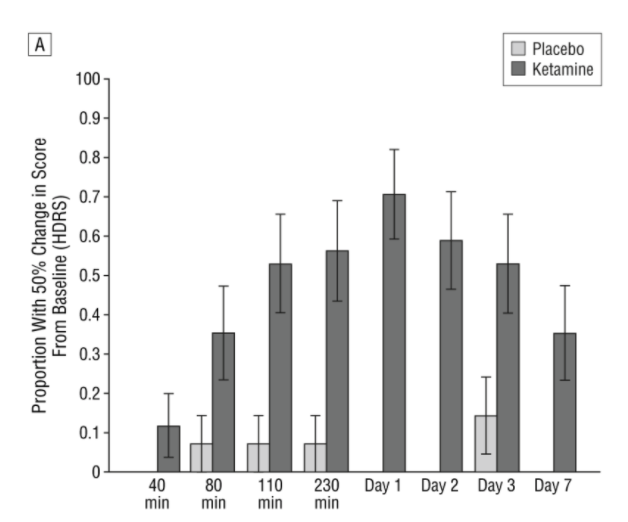“My current dose of meds weren’t cutting it anymore. I didn’t want to up my dose, but I needed a helping hand in calming my reactive body and mind. Within six hours of my first Ketamine session, I felt dramatically better, more grounded, less repetitive thoughts, and the darkness of depression significantly reduced. It was very reassuring to have the Ketamine-Assisted Psychotherapist “holding the space” when I was under the ketamine. In addition, having someone to help me process what I experienced during the treatment led to greater insights about my visions. I think people should embrace Ketamine-Assisted Psychotherapy as a great tool in the toolbox. I had fears about experiencing dark thoughts that would overwhelm me, but in all of my Ketamine sessions the opposite happened: I felt comforted and rejuvenated. And, knowing there was a therapist by my side at all times made it a very safe and nurturing environment.”
Ketamine-Assisted Psychotherapy Patient
“I started at IPC with severe depression, low self-confidence, and didn’t know what I wanted to do with my life. After my ketamine treatments, I finally stopped having suicidal thoughts. I have a positive outlook and feel a connection in my relationships. I also see how my degree is useful, and I’m connecting the dots between school and career. It was really nice to have a therapist to talk with throughout the Ketamine sessions about how to be my best self.”
Ketamine-Assisted Psychotherapy Patient
“I had treatment-resistant depression for my entire life. I know it sounds cliche but I was only seeing dark clouds. The ketamine sessions allowed me to start functioning again with the desire little by little to get off the couch and re-engage with life. I don’t think there would have been any effect without the therapist. The ability to discuss my experiences and to continue to work on these issues within the integrative sessions was invaluable.””
Ketamine-Assisted Psychotherapy Patient
“I struggled with depression. The ketamine sessions helped me gain more perspective. I’m now able to see my life and my existence in a larger context and pick up on things I couldn’t previously do. During the sessions, it was really helpful to have a therapist to create a safe container, guide me through the rough spots, and explore the deeper areas.”
Ketamine-Assisted Psychotherapy Patient
“Ketamine-Assisted Psychotherapy had a profound effect on my life. I struggled with chronic depression and was on meds for twenty years. I did the Ketamine series about a year ago and have not had any depression since the treatment. My baseline emotional affect has lifted. I gained tools along with new perspectives. My therapist was so supportive and understanding talking me through what I call the Ketamine world. We talked through how my new insights could be useful and help me with depression.”
Ketamine-Assisted Psychotherapy Patient
“Last summer, my twenty year old daughter was struggling with a horrible depression. She was having a hard time functioning, and pharmaceuticals didn’t work for her. We decided to have her try ketamine therapy at the Integrative Psychiatry Center. After six sessions, I saw my daughter completely emerge from her depression and she remains so all these months later. Due to the therapeutic assistance that she received during these sessions, she also seemed resourced to meet her life in new ways. I’m so grateful that IPC offers Ketamine treatment, and I highly recommend this therapy to others suffering from depression.”
Ketamine-Assisted Psychotherapy Patient
“Before Ketamine therapy I was struggling mostly with depression that had come on very suddenly and was very debilitating. After the Ketamine sessions, I noticed the depression I had been experiencing began to let up, I noticed I was able to make art again, and socialize with others much better than I had before. Having a therapist present made me feel safe and helped me negotiate some of the experiences I had while on the Ketamine, and also helped me negotiate my relationship with the traditional role of a therapist.”
Ketamine-Assisted Psychotherapy Patient
“I had been struggling with severe treatment resistant depression for many years before the Ketamine treatments. I had tried a large number of medications but none of them seemed to work for any length of time. I had been struggling with intermittent severe depression and suicidal thoughts just prior to the ketamine sessions. My mood lifted substantially during and after the sessions. I stopped having frequent suicidal thoughts. I also became more able to make changes in my life. The ketamine treatment was very freeing in this regard. I am a longtime binge-eater and have trauma and was able to work on these issues during the Ketamine sessions which really helped me make changes during and after the ketamine treatment.”
Ketamine-Assisted Psychotherapy Patient
“I decided to get treated at IPC specifically because they had a psychotherapist present during the ketamine administration. Following up with the therapist during and after the ketamine treatment was critical in reinforcing the changes that the ketamine was allowing me to make in my life. Having a therapist present was also important for helping me deal with traumatic memories that came up during the ketamine therapy. All of the staff at IPC were very caring and supportive. I had a wonderful transformative experience.”
Ketamine-Assisted Psychotherapy Patient
